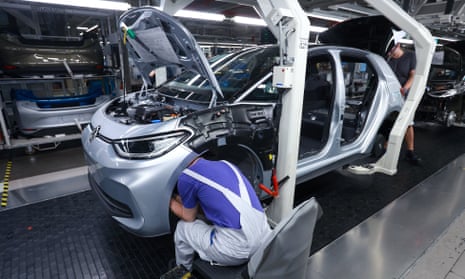
Volkswagen considers German plant closures to save billions in costs
Plans underline European carmakers’ problems in switching from petrol and diesel vehicles to electric models
Volkswagen is considering shutting two German factories, in what would be the carmaker’s first closures ever in its home country, as it struggles with the transition away from fossil fuels.
The Wolfsburg-based manufacturer on Monday informed its works council, which represents employees, that it was looking at closing “at least one larger vehicle manufacturing plant and one component factory in Germany” in order to find cost savings worth billions of euros.
The VW proposals underline the difficulties traditional European carmakers are having in switching from profitable but polluting petrol and diesel cars to cleaner but currently less profitable electric vehicles.
European and US carmakers are also under increasing pressure, particularly from Chinese electric vehicle manufacturers which have lower costs and higher profit margins.
Ford last month cited Chinese competition when it cancelled a plan to build a new electric SUV and delayed an electric pickup truck. General Motors, Mercedes-Benz and Volkswagen’s Bentley have delayed electrification plans, while the electric car pioneer Tesla is struggling to revive falling sales.
The EU has announced additional tariffs ranging from 17.4% to 37.6% on Chinese imports, which already carry a 10% import levy, arguing that the companies have benefited from heavy and unfair state subsidies. However, such is the cost advantage that many Chinese manufacturers may still be able to sell cars profitably in Europe.
Oliver Blume, the Volkswagen group chief executive, said: “The European automotive industry is in a very demanding and serious situation. The economic environment became even tougher, and new competitors are entering the European market.
“In addition, Germany in particular as a manufacturing location is falling further behind in terms of competitiveness. In this environment, we as a company must now act decisively.”
Volkswagen controls its eponymous brand as well as Audi, Porsche, Seat, Škoda and others. It said in July that it was considering closing an Audi factory in Belgium – its first proposed European factory closure, and the first for the group globally in 40 years.
However, closure of a factory in the mighty German automotive industry would represent a big strategic turn for the company, and would be highly politically controversial.
Germany’s economy has been dancing on the edge of technical recession for nearly two years, a backdrop weighing heavily on the car industry just as it looks for the cash to build new electric cars.
Fears of Volkswagen factory closures add to pressure on the chancellor, Olaf Scholz, over the ailing economy and the rise of the far right after the parties in the country’s ruling coalition lost an election in the German state of Thuringia to Alternative für Deutschland. It was the first time a state election had been won by a far-right party since the Nazi period.
The VW works council said all German factories under the group could be at risk.
after newsletter promotion
The carmaker is also considering a U-turn on previous investment commitments, including a compact electric SUV that was meant to secure production at VW’s main plant at Wolfsburg from 2026 onwards, and the Trinity saloon models planned for another factory in Zwickau.
Thomas Schäfer, the chief executive of the Volkswagen brand, said: “Plant closures at vehicle production and component sites can no longer be ruled out.”
Daniela Cavallo, the chair of Volkswagen’s works council, said it would mount “fierce resistance” against the proposed closures, and accused the carmaker’s board of failure.
“With us, there will be no site closures,” she said. “Instead of making one-sided savings at the expense of the workforce, we now need a strategic boost for the actual weaknesses: product, complexity, processes, synergies. That is the plan we need.”
Thorsten Gröger, a lead negotiator covering VW for the union IG Metall said it was an “irresponsible plan that shakes the foundations of Volkswagen and poses a massive threat to jobs and sites”.
“This course is not only shortsighted, but highly dangerous – it risks destroying the heart of Volkswagen,” he added, saying the union would fight with all its strength to protect jobs.